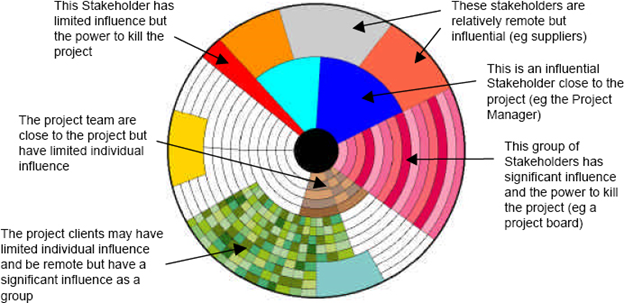Building Project Relationships: Setting Expectations With Stakeholders

The success criterion of a project is no more a topic of managing iron triangle, but about delivering benefits and building long-term relationships for becoming preferred solution/business partners.
The long-term relationships require thorough understanding and managing of the project relationships which occur between the project manager and project’s internal and external stakeholders.
In order to win projects and please the stakeholders, organizations often forget to build long-term relationships which are not built even after delivering the project on the aggressive timelines or providing delighters in the project.
The reasons are multi-faceted. One of the critical and overlooked reason is the lack of expectation setting between the project team(s) and its various stakeholders at the project initiation stage and adjustments during the execution stage.
This expectation setting becomes more critical when the number of project stakeholders are more either due to scope, impact or visibility.
It is very important to identify the stakeholders and analyze their influence which becomes a critical success factor for the project manager, project teams, the beneficiaries and the project.

Image source: https://www.pmi.org/learning/library/project-relationships-stakeholder-circle-8092
The expectation setting also helps in reaching a working agreement to allow the project teams to understand their roles and responsibilities without overlapping and missing activities necessary for effective execution.
It also helps in resolving the dependency loops apparently created on specific roles due to team and project dynamics. It is imperative to set realistic expectations and adjust them when the situation changes or is needed.
The proactive approach towards expectation setting helps immensely while delivery risks are anticipated, or issues start creeping in as it ensures the customer alignment even if the project objectives or deliverables do not meet the initial expectations.
It also tends to bring the transparency and trust between the project stakeholders. The supportive leadership can only allow the dialogue to happen between project teams and stakeholders instead of one-sided directive execution.
Expectation setting is also an effective and proactive conflict resolution tool in the initial stages of Tuckman’s Team Development model. Expectation setting is a democratic and more acceptable way of aligning the internal and external stakeholders across the projects, programs and portfolios.
The boundaries of the roles and responsibilities make the communication channel clear and allow swift progress reporting in a more structured form.
It is also important for the project manager to understand the political side of the project management as various organizations and business units are involved with their own targets and interests.
It becomes slightly tricky to deal with various stakeholders as the project managers need to understand their objectives and motives within the organization.
It is not necessary to make everyone happy, but it requires more of interpersonal skills for understanding the influence and behavior which can bring positive or negative impact to the project outcomes.
It is pertinent to acknowledge the political environment in an organization because it is a natural part of human interaction and as the number of groups and sub-groups increases, the degree of politics naturally tends to increase.
Nevertheless, this does not change the basic principles and best practices to execute and deliver a project. The only difference is when to use a specific technique or a best practice for a given situation without damaging the relationship.
During this course of communication, disagreement may come which is perfectly fine, but the project manager must change the perspective by using the following three-pronged approach for building stronger project relationships and repeat business:
1. Focus on Value Delivery– This approach may require adjustment to the existing success criteria of the project from output-based approach to outcome-based approach. The existing project goals and the metrics need to be aligned to deliver benefits and not just the features.
In plan driven project execution methodologies, Earned Value Management approach is a more systematic and objective way of measuring project performance and progress unlike other approaches.
2. Focus on Effectiveness & Impact– Effectiveness will require the quality aspect to be more seamless and not taking forward the technical debt and defects in subsequent releases.
The effectiveness metrices will also include the element of efficiency in terms of improved cycle time and lead time with improved release frequency and stabilization period.
Also, the project manager must understand that schedule crashing is not always the best way of schedule compression or crunching as it may not bring the desired efficiency but increased integration effort.
It may look good for the purpose of resource loading and meeting the delivery timelines but may prove to be an ineffective approach as the project progresses. The focus on business impacts such as increased market share are long-term or indirect effects of the outcomes.
3. Focus on Usability and Customer Satisfaction– An important aspect of building project relationships is to bring the customer-centricity and usability in the forefront.
The features or the requirements delivered are not enough from the success perspective if the customer viewpoint is not considered in terms of usefulness of the product or features or services delivered and whether they are meeting the expectations.
At the same time, the customer or user satisfaction gap to find the difference between desired experience and current experience becomes critical to find the unrealized value which could help in exploring the potential future value.
The above approach is in line with the realistic expectation setting for effective stakeholder management and not optimistic expectation which may doom the project despite burning midnight oil involving relentless efforts of the delivery teams and other stakeholders.
Summary:
An important aspect of building project relationships requires different stakeholder engagement approaches and participation methods for providing information, consultation, collaboration, delegation and self-management.
Building project relationships also requires a planning approach which can allow the adjustment of expectations as per the project dynamics. A popular planning approach known as “Rolling-wave planning” allows the project planning in waves as the project progresses and allows the project teams, requirements and relationships to collaborate and evolve.
It is also like the Scrum process framework in Agile software development where potentially releasable done increment to be shipped in shorter iterations is based on high-level assumptions/expectations and not complete upfront planning.
There is a cushion for adjustments of expectations through empirical management which allows continuous flow of delivery with built-in quality parameters.
Acknowledgments and References
Bourne, L. (2006). Project relationships and the Stakeholder Circle™. Paper presented at PMI® Research Conference: New Directions in Project Management, Montréal, Québec, Canada. Newtown Square, PA: Project Management Institute.
https://www.pmi.org/learning/library/project-relationships-stakeholder-circle-8092
About the Author
Gaurav Dhooper is a strategic thinker, a professional Agile and IT Delivery Leader, an author and a speaker. Gaurav writes articles on Digital Transformation, Agile Transformation, Agile Project Management and Scrum.
He also writes articles on Robotic Process Automation, Artificial Intelligence, Machine Learning and Personal Agility in leading online publications. Gaurav has been reviewer for PMI’s Standard for Earned Value Management and a book on Agile Contracts.
He is also a Webinar and keynote speaker in various global conferences and Reviewing Committee Member in PMO Global Awards 2020. Gaurav has been awarded an honorary position of Senior Official of IAPM, Switzerland for Metropolitan area of Noida, India.




